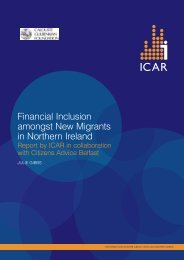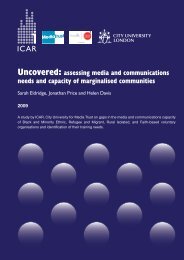The Somali community in the UK: What we know and how we ... - ICAR
The Somali community in the UK: What we know and how we ... - ICAR
The Somali community in the UK: What we know and how we ... - ICAR
You also want an ePaper? Increase the reach of your titles
YUMPU automatically turns print PDFs into web optimized ePapers that Google loves.
emerges as <strong>the</strong> most significant factor <strong>in</strong> <strong>Somali</strong><br />
women’s experience.<br />
Mental health<br />
But <strong>the</strong> area of health does not only cover disease<br />
<strong>and</strong> management of life cycle events. ‘Health’<br />
refers to a state of <strong>we</strong>llbe<strong>in</strong>g, <strong>in</strong> which physical<br />
<strong>and</strong> psychological aspects are <strong>in</strong>tertw<strong>in</strong>ed. Mental<br />
disturbance is often somatised - anxiety <strong>and</strong> stress<br />
expressed <strong>in</strong> aches <strong>and</strong> pa<strong>in</strong>s. Both m<strong>in</strong>d <strong>and</strong> body<br />
need attention, but it is sometimes easier for<br />
busy doctors to dole out medication. As a <strong>Somali</strong><br />
refugee <strong>in</strong> Liverpool commented:<br />
<strong>The</strong> doctor does not give me enough time<br />
to expla<strong>in</strong> my symptoms. Before hear<strong>in</strong>g me<br />
out, he gives me pa<strong>in</strong>killers. I am always given<br />
pa<strong>in</strong>killers as a solution. (Xifaras, 1996: 43)<br />
Significantly, <strong>the</strong>re is more material on mental than<br />
physical problems. 111 In her study of <strong>the</strong> health<br />
needs of refugees <strong>in</strong> To<strong>we</strong>r Hamlets, Green (2001:<br />
26) found that it was <strong>the</strong> <strong>Somali</strong> <strong>community</strong> that<br />
had <strong>the</strong> greatest mental health requirements. In<br />
discuss<strong>in</strong>g health, <strong>Somali</strong>s <strong>the</strong>mselves speak of<br />
<strong>the</strong> prevalence of mental suffer<strong>in</strong>g, rang<strong>in</strong>g from<br />
symptoms of stress to <strong>the</strong> alarm<strong>in</strong>g <strong>in</strong>crease <strong>in</strong><br />
suicide, especially among young men. 112 This<br />
is borne out by studies. Farah <strong>and</strong> Smith (1999:<br />
110; 115-116) found that 46% of <strong>the</strong> 56 children<br />
referred to <strong>the</strong> <strong>Somali</strong> Support Initiative <strong>in</strong> east<br />
London schools had health problems. Roughly<br />
categorised, 23% had physical symptoms, <strong>and</strong> 37.5%<br />
mental conditions. <strong>The</strong> psychological difficulties<br />
ranged from autism <strong>and</strong> severe conduct disorder<br />
<strong>and</strong>/or severe learn<strong>in</strong>g difficulties to behavioural<br />
problems <strong>and</strong> traumatic reaction to stress.<br />
In a two year project, <strong>Somali</strong> Mobility <strong>and</strong> Mental<br />
Health Research (SOMMER), researchers at K<strong>in</strong>g’s<br />
College <strong>and</strong> Queen Mary, London, are measur<strong>in</strong>g<br />
<strong>the</strong> prevalence rates of common mental health<br />
problems, levels of geographical mobility <strong>and</strong> health<br />
service utilisation among <strong>Somali</strong> refugees liv<strong>in</strong>g<br />
<strong>in</strong> <strong>the</strong> London boroughs of To<strong>we</strong>r Hamlets <strong>and</strong><br />
Lambeth. Prelim<strong>in</strong>ary f<strong>in</strong>d<strong>in</strong>gs, which are based<br />
on a population sample of 143 <strong>Somali</strong>s, s<strong>how</strong> that<br />
depression, post-traumatic stress disorder (PTSD),<br />
<strong>and</strong> anxiety disorders are <strong>the</strong> most common<br />
mental health problems among this <strong>community</strong>. For<br />
some, geographical mobility <strong>and</strong> constant chang<strong>in</strong>g<br />
of address are also associated with depressive<br />
disorders. 113<br />
Hermione Lovell <strong>and</strong> Ze<strong>in</strong>ab Mohamed’s ongo<strong>in</strong>g<br />
study of Worries <strong>and</strong> <strong>we</strong>ll-be<strong>in</strong>g <strong>in</strong> <strong>the</strong> <strong>Somali</strong><br />
<strong>community</strong> <strong>in</strong> Manchester illustrates <strong>the</strong> diversity of<br />
<strong>the</strong> <strong>Somali</strong> <strong>community</strong> both <strong>in</strong> its experience <strong>and</strong><br />
<strong>in</strong>terpretation of mental distress. <strong>The</strong> high levels<br />
of depression which <strong>the</strong>y found appear to have<br />
different roots accord<strong>in</strong>g to generation. Older<br />
people are laid low by <strong>the</strong> comparison bet<strong>we</strong>en<br />
<strong>the</strong>ir British reality <strong>and</strong> <strong>the</strong>ir memories of <strong>Somali</strong>a<br />
- isolation compared with sociable communality;<br />
grey skies, cold, <strong>and</strong> ra<strong>in</strong> <strong>in</strong> contrast to <strong>the</strong> warmth<br />
<strong>and</strong> brightness of <strong>Somali</strong> sun. <strong>The</strong> preoccupations<br />
of <strong>the</strong>ir children, with little or no recall of <strong>the</strong>ir<br />
homel<strong>and</strong>, have more to do with <strong>the</strong> conflict<br />
bet<strong>we</strong>en <strong>the</strong>ir home environment <strong>and</strong> <strong>the</strong> culture<br />
of school <strong>and</strong> peers.<br />
Class <strong>and</strong> generation are fur<strong>the</strong>r factors affect<strong>in</strong>g<br />
<strong>the</strong> level of vulnerability. Elite urbanites may have<br />
suffered <strong>the</strong> effects of war, but will not feel as lost<br />
as a rural refugee with a nomadic background,<br />
accustomed to <strong>the</strong> slow rhythm of herd<strong>in</strong>g ra<strong>the</strong>r<br />
than <strong>the</strong> rush of cities. Such a transition can<br />
generate a corrod<strong>in</strong>g fearfulness, not underst<strong>and</strong><strong>in</strong>g<br />
<strong>how</strong> to h<strong>and</strong>le novel situations, alarmed at <strong>the</strong><br />
changes <strong>in</strong> <strong>the</strong>ir children, <strong>and</strong>, as one young woman<br />
put it, “afraid of what <strong>the</strong>y don’t <strong>know</strong>”. 114 For<br />
<strong>the</strong> more educated, it is <strong>the</strong> loss of status <strong>and</strong> selfesteem<br />
that underm<strong>in</strong>es <strong>the</strong>ir confidence.<br />
Cross-cultural diagnosis of mental illness is<br />
famously difficult. Part of <strong>the</strong> problem is translation.<br />
This is reflected <strong>in</strong> practice, <strong>in</strong> <strong>the</strong> surgery or<br />
consult<strong>in</strong>g room, where, as is most often <strong>the</strong> case,<br />
practitioner <strong>and</strong> patient do not share a common<br />
tongue. A friend, relative, or child may be brought<br />
along to <strong>in</strong>terpret, but <strong>the</strong> lack of privacy can<br />
<strong>in</strong>hibit discussion of <strong>in</strong>timate matters or emotional<br />
states. But <strong>the</strong>re are more fundamental problems<br />
of language which go beyond comm<strong>and</strong> of English.<br />
Diagnosis is culturally determ<strong>in</strong>ed, <strong>and</strong> many of<br />
<strong>the</strong> categories of <strong>we</strong>stern medic<strong>in</strong>e <strong>and</strong> psychiatry<br />
have no <strong>Somali</strong> equivalent. Marian Bullivant <strong>and</strong><br />
54 <strong>The</strong> <strong>Somali</strong> <strong>community</strong> <strong>in</strong> <strong>the</strong> <strong>UK</strong>

















